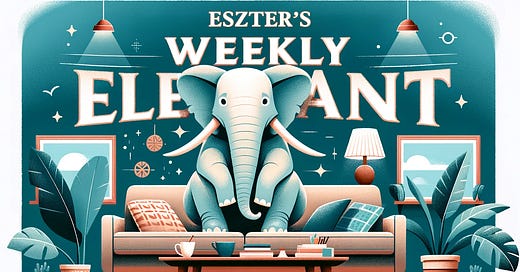Welcome to the eighth issue of Eszter’s Weekly Elephant! We hope your week has been pleasant so far! Let's dive into this week's topics.
First of all, let's play a little!
I ask everyone to imagine waking up in the middle of nowhere, in the Colorado mountains during winter. In the vicinity, there are only trees, a stream, and a single makeshift hut. The hut stands empty. It's cold outside, so the only logical decision is to go inside and look around. Inside the hut, there's an iron stove with a small door for inserting firewood, a bed with a few crumpled blankets, a chair, and a pocketknife on the table. It starts to snow outside, and it gets colder in the hut. Clearly, it's necessary to start a fire, so you step outside to look for something to burn. Behind the hut, logs are piled up, but each is much larger than the stove's door where the wood should be inserted. No axe can be found, so you reluctantly start to whittle some wood shavings from one of the logs with the knife found in the hut. An hour passes, your fingers freeze, and you gather only three or four handfuls of small wood pieces. Obviously, this won't last through the night, so you decide the knife is unfit for the task and discard it.
In order to fashion something axe-like, you start looking for a larger stone.The wind whistles in your ears, and falling snow constantly impedes your vision. Despite this, after half an hour, you find a flat stone with a somewhat sharp edge, which you try to attach to a thicker branch to split the logs. With much difficulty, you sharpen the flat stone with another rock, then attach it to one of the hut's chair legs, which you've broken off, using your belt. After you're done with the makeshift axe, you go outside and start hitting one of the logs in the increasingly heavy snow. The log jumps away, then a small piece breaks off, but the axe isn't sharp enough, and the belt doesn't hold the stone well enough to exert real force. After a few hours, all your energy is depleted, and terrible anger overtakes you. In the midst of furious cursing, you blindly throw the makeshift axe into the forest and resign yourself to the idea that starting a fire was foolish to begin with. Who the hell needs a fire anyway? Only the weak. You are a strong, resilient person and can endure the night and even the entire winter without fire!
I'm curious to see how people evaluate this short story. Who thinks they could endure the winter, survive the night, and who thinks the idea of starting a fire is indeed sensible and necessary, just needing the right tools because neither the small knife nor the blunt, poorly attached stone are suitable for the task.
Why did I tell this story and ask the reader to imagine themselves in this situation? Well, because lately, I hear more and more that mental work, dissecting feelings, is utterly pointless, and with the help of psychologists and psychiatrists, generations of adults have become completely useless, overly sensitive, incapable of living and fighting. What we need are tough people who can stand their ground in life and achieve their goals, in which the new kind of upbringing that deals with kids' moods and feelings apparently failed, leading to more adults suffering from depression and various mental illnesses. Back in the good old days, there were strong and courageous men and resourceful women, unlike today's constantly whining men and women.
In my opinion, this argument is as sensible as claiming in the story above that the idea of starting a fire is stupid and unnecessary. The fact that we've been using the wrong methods so far, haven't yet found truly effective tools, and haven't achieved the expected results, doesn't mean the entire idea is foolish. It just means we need to try a different approach.
My experience also indicates that although psychology can offer help in some areas and aid in understanding certain relationships, it is not equipped to resolve real, deep-seated emotional issues. I know this statement will upset many, but I emphasize that I am speaking from my own experiences, and this is what they show.
I have seen some people who have spent years with a psychologist and have sunk into a kind of self-pity. After a while, they may no longer see beyond their problems and might even forget to live, merely licking their emotional wounds. I understand that seeing this in their acquaintances or experiencing it themselves, many people may think that the entire concept of dealing with one's feelings, addressing traumas, and striving for healing is completely pointless.
But this is exactly like rejecting the idea of starting a fire because the method we started with wasn't right.
Recently, Elon Musk recommended a book whose key message is that children need structure, strict rules, and not to focus on their feelings, then they won't grow up to be whiny snowflakes. However, the ironic situation that has arisen is that the very tough, resourceful adults we now refer to, saying we should teach that old model and show that example to children—that their feelings are not important, that they should do nothing with their traumas, that they should just forget all the bad things that happened to them—led exactly to generations who, based on their own bad experiences and cold childhoods, wanted a better childhood for their own kids and started to deal with their own and their children's feelings.
In other words, the thesis that forgetting our feelings, not dealing with our traumas, and strict rules result in happy children was disproven in practice. The parents of today's youth did not see that as the key to happiness, so they tried something else. They tried to start a fire.
Maybe they didn't have the right tools, maybe they haven't managed to start that fire yet, maybe only smoke is coming out of the stove, but they tried. And if we decide that instead of further refining our methods, correcting the stone's attachment to the handle to make it more effective, fine-tuning our tools, we discard the whole idea, then I think we're making a very big mistake.
This would be akin to Elon Musk deciding to give up and return to seventies technology after his third rocket exploded. He didn't decide that, did he? Just as other engineers, inventors, researchers didn't. Experimentation, failures, dead ends, and successes are all part of progress. And I believe that in this area, we are far from having perfect tools. We may be at the point where we have quite effective tools, like my personal favorites family constellation and craniosacral therapy, plus there are a few more, but we are still not at the point where these couldn't be improved.
This requires time, patience, and experimentation. And my husband and I have done exactly this over the past decades, as have many others who understood that there is now a greater need for emotional and self-awareness work than ever before. This is precisely why I write and publish articles, short stories, guides, and essays in Eszter’s Weekly Elephant, so that the knowledge and those methods we have gathered, which are more effective than previous ones, can be accessed and benefited from by others.
Although I understand the mindset of disregarding our emotional lives and feelings and I emphasize I am aware of the current most widespread methods' shortcomings and deficiencies, in my opinion, it would be a mistake to throw the baby out with the bathwater.
I'm curious about your opinions on this matter. Please share your experiences and opinions in the comments.
Now let's move on to our topics for this week!
This time, we've explored topics related to work, success, career, and childhood sexual abuse in Eszter’s Weekly Elephant.
This week, one of the articles discussed why adults who have experienced childhood trauma find it harder to cope with workplace stress and why they react more intensely when involved in any workplace conflict. Understanding this correlation gives us a compelling reason to start processing our childhood experiences. Those interested in the article can find it here:
This week's short story addressed a topic that affects many but is seldom discussed willingly due to the shame, fear, anger, and pain associated with it. Many people, even in adulthood, are hesitant to confront the fact that they were victims of sexual abuse in their childhood, let alone start processing their feelings about it. Reading the short story titled "The Veranda" can be the first step on this difficult but promisingly positive journey.
Why do I say this journey promises many results? Having worked with many clients, I've seen the extensive impact that unprocessed childhood sexual trauma can have on various aspects of a person's life. For instance, it influences self-esteem, relationships, career, health (for example in many cases the unprocessed childhood sexual trauma is directly linked to extra pounds), boundary-setting abilities, and much more. Hence, I've often seen that as my clients worked on themselves and healed, more and more positive changes occurred in their lives. Often in areas we didn't even assume could be related to this issue. So, anyone who wants to start on the path of healing should read the short story! And let's not forget: healing and inner work are never as daunting as they seem.
This week also saw the publication of a personal essay, in which I explored through one of my childhood's defining fairy tales, "The Little Match Girl," how to work with fairy tales, like those by Grimm and Andersen, and folk tales. This story has always been close to my heart and never left me at peace. I never understood why until I examined precisely where I see myself in the story and realized that this tale highlighted a significant blind spot for me. Those interested in what this blind spot is and how I finally managed to illuminate it within myself, read on!
My personal email address for paying subscribers
We are offering a new opportunity for our paying subscribers! Anyone who would like to ask me about their own problems or about the topics discussed in "Eszter's Weekly Elephant" privately can do so by sending their question to my email address, which is available exclusively for paying subscribers. If you are curious about my experiences and perspective on your problem, do not hesitate to write to me!
This brings us to this week's content for paid subscribers. Your support means a lot!
This week, we're discussing a very common phenomenon with our paid subscribers: the glass ceiling, which appears in many families, many human relationships, and embitters life. To decide and clearly see whether we live our lives under a glass ceiling, I've described in the paid article the operational principle of the glass ceiling and the signs that it hovers over our heads. The article also discusses how to eliminate this uncomfortable state if we wish to.
For those who enjoyed the short story "The Veranda" and feel like they want to take a few more steps on the path of healing, read the guide associated with the short story, where I talk in detail about the different layers of emotions caused by sexual abuse. Those who want to heal from childhood sexual abuse should first understand the emotional baggage they need to unpack. Honest answers to the questions posed in the guide can help in identifying these packages, and assist the reader in healing.
Thank you!
We hope that this week we've provided you with exciting information and entertaining stories again!
Thank you for reading Eszter's Weekly Elephant regularly. We are delighted that you find our writings interesting and hope we can welcome you among our paid subscribers!
Your support makes a whole world of difference; it is what keeps us going! :)
Sincerely,
Here is my personal email for paid subscribers, you can ask personal questions and receive personalized answers to those you might not wish to ask publicly.
Disclaimer: The content in our publications should not be considered professional psychological or psychiatric advice. Thus, everyone reads the posted writings and applies their content at their own risk.
Some links above are Amazon affiliate links, and if you buy something through these links I may earn a small commission at no extra cost to you.
Home | Notes | Articles | Eszter’s Magic | Literary Bonbons | Short Stories and Guides | Beyond the Book | EWE Issues | Archive | About










